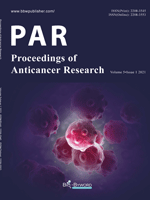Abstract
Objective: To explore the effect of propofol (Prof) on the proliferation, migration and invasion of human gastric cancer cell MGC-803 and its molecular mechanism. Methods: The MTT method was used to study the effects of Prof with different doses and durations on the viability of MGC-803 cells. Hoechst 33258 staining and electron microscopy were used to detect the effects of Prof on MGC-803 cell apoptosis. Transwell experiments were used to detect the effects of Prof on the migration and invasion of MGC-803 cells. RT-PCR detects the effect of Prof on the expression of miR-195 in MGC-803 cells, and Western Blot detects the effect of Prof on the protein expression of JAK/STAT signaling pathway. Results: Compared with 0mg/ml Prof, 5mg/ml, 10mg/ml and 20mg/ml Prof treatment with 24h, 48h and 72h can significantly reduce cell viability (P <0.05). Compared with the Control group, the percentage of Hoechst 33258 staining positive cells in the Prof group and the apoptosis rate under the electron microscope were significantly increased (P <0.05). Compared with the Control group, the cell migration rate and invasion rate of the Prof group were significantly reduced (P <0.05). Compared with the Control group, the expression of miRNA-195 in the Prof group cells was increased significantly (P <0.05). Compared with the Control group, the activity of p-Jak1 and p-STAT3 proteins in the Prof group were significantly reduced (P <0.05). Conclusion: Prof can reduce the cell viability, migration and invasion of gastric cancer cell MGC-803, and promote its apoptosis. Its mechanism may be related to the promotion of miR-195 expression and inhibition of JAK/STAT signal pathway activity.
